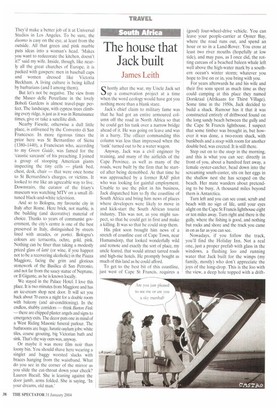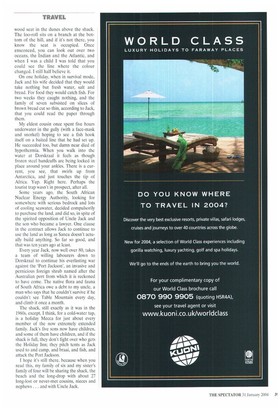The house that Jack built
James Leith Shortly after the war, my Uncle Jack set up a conservation project at a time when the word ecology would have got you nothing more than a blank stare.
Jack's chief claim to military fame was that he had got an entire armoured column off the road in North Africa so that he could get his tank over a narrow bridge ahead of it. He was going on leave and was in a hurry. The officer commanding this column was less than impressed when the 'tank' turned out to be a water wagon.
Anyway, Jack was a civil engineer by training, and many of the airfields of the Cape Province, as well as many of the roads, were built by the firm that he started after being demobbed. At that time he was approached by a former RAF pilot who was looking for gainful employment. Unable to use the pilot in his business, Jack dispatched him to fly the coastline of South Africa and bring him news of places where developers were likely to move in and kick-start the South African tourist industry. This was not, as you might suspect, so that he could get in first and make a killing. It was so that he could stop them.
His pilot soon brought him news of a stretch of coastline east of Cape Town, near Humansdorp, that looked wonderfully wild and remote and exactly the sort of place, my uncle feared, that would attract tarred roads and high-rise hotels. He promptly bought as much of this land as he could afford.
To get to the best bit of this coastline, just west of Cape St Francis, requires a (good) four-wheel-drive vehicle. You can leave your people-carrier at Oyster Bay, where the road runs out, and spend an hour or so in a Land-Rover. You cross at least two river mouths (hopefully at low tide), and may pass, as I once did, the rotting carcass of a beached baleen whale left well above the high-water mark by a southern ocean's winter storm; whatever you hope to live on or in, you bring with you.
For years afterwards he and his wife and their five sons spent as much time as they could camping at this place they named Dorskraal (Afrikaans for Thirst Village). Some time in the 1950s, Jack decided to build a shack. Rumour has it that it was constructed entirely of driftwood found on the long sandy beach between the gully and the Cape St Francis lighthouse. I suspect that some timber was brought in, but however it was done, a two-room shack, with bunkbeds and a stoep with room for another double bed, was erected. It is still there.
Step out on to the stoep in the morning, and this is what you can see: directly in front of you, about a hundred feet away, a female oyster-catcher, head down into the screaming south-easter, sits on her eggs in the shallow nest she has scraped on the beach. Her mate wanders about pretending to be busy. A thousand miles beyond them is Antarctica.
Turn left and you can see coast, scrub and beach with no sign of life, until your eyes alight on the Cape St Francis lighthouse eight or ten miles away. Turn right and there is the gully, where the fishing is good, and nothing but rocks and shore and the track you came in on as far as you can see.
Nowadays, if you follow the track, you'll find the Holiday Inn. Not a real one, just a proper prefab with glass in the windows, a flushing loo and running water that Jack built for the wimps (my family, mostly) who don't appreciate the joys of the long-drop. This is the loo with the view, a deep hole topped with a drift
wood seat in the dunes above the shack. The loo-roll sits on a branch at the bottom of the hill, and if it's not there, you know the seat is occupied. Once ensconced, you can look out over two oceans, the Indian and the Atlantic, and when I was a child I was told that you could see the line where the colour changed. I still half believe it.
On one holiday, when in survival mode, Jack and his wife decided that they would take nothing but fresh water, salt and bread. For food they would catch fish. For two weeks they caught nothing, and the family of seven subsisted on slices of brown bread cut so thin, according to Jack, that you could read the paper through them.
My eldest cousin once spent five hours underwater in the gully (with a face-mask and snorkel) hoping to see a fish hook itself on a baited line that he had set up. He succeeded too, but damn near died of hypothermia. When you walk into the water at Dorskraal it feels as though frozen steel handcuffs are being locked in place around your ankles. There is a current, you see, that swirls up from Antarctica, and just touches the tip of Africa. Yup. Right here. Perhaps the tourist trap wasn't in prospect, after all.
Some years ago. the South African Nuclear Energy Authority, looking for somewhere with serious bedrock and lots of cooling seawater, decided compulsorily to purchase the land, and did so, in spite of the spirited opposition of Uncle Jack and the son who became a lawyer. One clause in the contract allows Jack to continue to use the land as long as Sanea doesn't actually build anything. So far so good, and that was ten years ago at least.
Every year Jack, now well over 80, takes a team of willing labourers down to Dorskraal to continue his everlasting war against the 'Port Jackson', an invasive and pernicious foreign shrub named after the Australian port from which it is reckoned to have come. The native flora and fauna of South Africa owe a debt to my uncle, a man who says that he couldn't survive if he couldn't see Table Mountain every day, and climb it once a month.
The shack, still exactly as it was in the 1960s, except, I think, for a cold-water tap, is a holiday Mecca for just about every member of the now extremely extended family. Jack's five sons now have children, and some of them have children, and if the shack is full, they don't fight over who gets the Holiday Inn; they pitch tents as Jack used to and camp, and braai, and fish, and attack the Port Jackson.
I hope it's still there, because when you read this, my family of six and my sister's family of four will be sharing the shack, the beach and the long-drop with about 27 long-lost or never-met cousins, nieces and nephews . . . and with Uncle Jack.





























































































 Previous page
Previous page